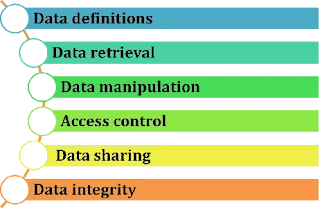FUNCTIONS OF DBMS
Database management system (DBMS) functions are important for efficient and organized database management.
These functions include:
1. Data Definition: Involves defining the database structure, allowing users to create, modify and delete various database objects such as tables, views, indexes, and constraints.
This function establishes the framework for organizing and storing data.
2. Data Manipulation: Provides tools and commands to manipulate data in the database.
Users can perform operations such as inserting new data, updating existing records, deleting unnecessary information, and querying data to get specific information.
3. Data Retrieval: Allows users to retrieve specific data from the database using query languages such as SQL.
This functionality allows efficient and targeted access to information stored in the database.
4. Data security: Implement security measures to protect databases from unauthorized access.
This includes authentication processes, authorization controls, and encryption methods to ensure data confidentiality, integrity, and availability.
5. Data Integrity: Enforce data integrity constraints to maintain the accuracy and consistency of data stored in the database.
This involves defining rules and relationships to avoid discrepancies or errors in data.
6. Concurrency Control: Manage simultaneous access to the database by multiple users or applications.
This feature ensures data consistency and avoids conflicts that can arise when multiple users try to modify or retrieve data at the same time.
7. Backup and recovery: Provides a mechanism to regularly back up database content and restore data in the event of an error or disaster.
This feature is important for maintaining data durability and ensuring information can be recovered in the event of an unexpected incident.
In summary, DBMS functions collectively contribute to effective database management by addressing aspects such as structure definition, data manipulation, recovery, security, integrity, concurrency control and backup/restore.
These functions are essential for maintaining reliable, secure, and accessible databases in modern information systems.
.jpeg)

Comments
Post a Comment